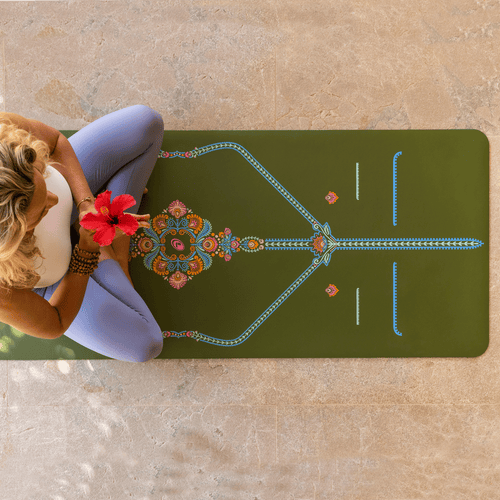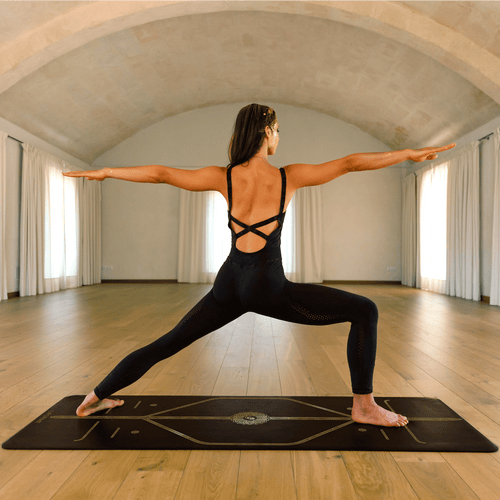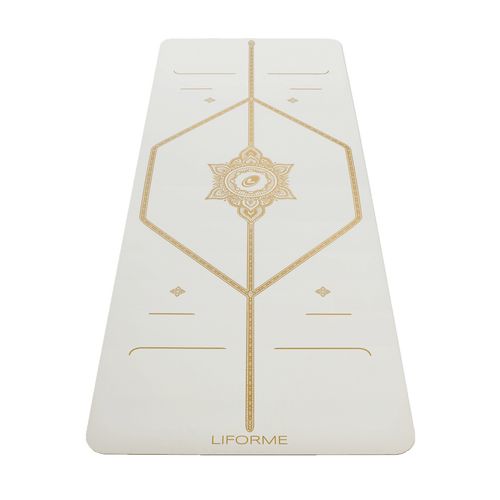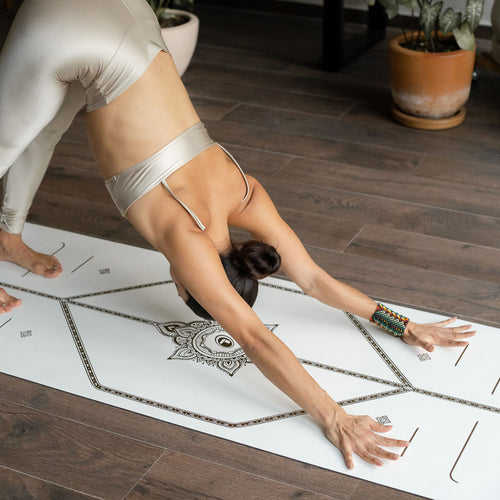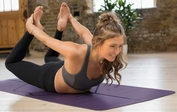When the weather is cold, yoga warms you from the inside out. A sequence of flowing movements and long hold times in poses that activate your major muscle groups will stoke your inner fire and help you shake off the icicles, leaving you feeling more energized and a lot warmer. To lift your mood even more, set up your mat in a sunny spot if you can. Start this sequence in a sweatshirt and you’ll be stripping down to a tank-top before long!

1. Thunderbolt Pose (Vajrasana) with Skull-Shining Breath (Kapalabhati Pranayama)
Sanskrit Meaning: Vajra (Thunderbolt); Kapala (Skull) Bhati (Light)
Yoga Level: Intermediate
Pose Type: Seated
Benefits: Stretches the thighs and feet. Clears the sinuses.
Cautions: Avoid this breath if you are pregnant.
Why this pose: Kapalabhati is known as ‘breath of fire’ for its warming effects.
Warming Tips:
- Since you are going into this pose cold, take a block under your seat for extra support.
- To do Kapalabhati, each exhale is a forceful expulsion of breath while each inhale is passive.
- When you exhale, draw your navel strongly toward your spine.
- If you are experienced, you can go for a minute. If this breath is new to you, start with a count of 10 breaths and increase gradually.
- Stop this pranayama if you feel lightheaded.
- You can initiate Kapalabhati in any posture to build more heat.

2. Downward Facing Dog (Adho Mukha Svanasana)
Sanskrit Meaning: Adho (Down) Mukha (Face) Svana (Dog)
Yoga Level: Beginner
Pose Type: Standing/Inversion
Benefits: Activates your whole body, waking up your muscles.
Why this pose: Down Dog gets your body working and starts to build heat in your arms, legs, and core.
Warming Tips:
- Peddle your feet to stretch your hamstrings.
- Soften your knees and elbows.
- Hold for about 10 breaths to build strength.

3. Plank Pose (Phalakasana)
Yoga Level: Beginner
Pose Type: Arm Support
Benefits: Strengthens the arms and core.
Why this Pose: Move the fire into your core by holding Plank pose for up to a minute. Activate your abs by gently drawing your navel toward your spine.
Warming Tips:
- Give your posture structure by stacking your shoulders over your wrists and keeping your neck in line with your spine.
- Focus on your breath to help you stay in the pose a little longer.

4. Chair Pose (Utkatasana)
Sanskrit Meaning: Utkata (Powerful)
Yoga Level: Beginner
Pose Type: Standing
Benefits: Strengthens your legs and core, improves balance.
Why this Pose: You’ll feel the burn in your quads when you’re holding Chair Pose.
Warming Tips:
- Imagine sending your breath into your legs when they start to get tired.
- Keep your arms overhead to engage your whole body or bring your palms together at your sternum to focus on your legs.

5. Eagle Pose (Garudasana)
Sanskrit Meaning: Garuda (Eagle)
Yoga Level: Intermediate
Pose Type: Standing Balance
Benefits: Stretches the hips, shoulders, and upper back. Improves core and leg strength.
Why this Pose: Standing on one leg brings even more heat to your mat.
Warming Tips:
- Eagle is based on a one-legged chair pose, so keep your squat low to continue to work your legs and balance.

6. Goddess Pose (Utkata Konasana)
Sanskrit Meaning: Utkata (Powerful), Kona (Angle)
Yoga Level: Beginner/Intermediate
Type of Pose: Standing
Benefits: Opens the hips and groins, strengthens the feet, thighs, and back.
Why this Pose: Maintaining your alignment in this squat makes it a challenging posture and works your legs continuously.
Warming Tips:
- Try to stack your knees over your ankles and keep your thighs parallel to the floor.
- This is a difficult position to maintain so keep your attention on constantly readjusting your stance.
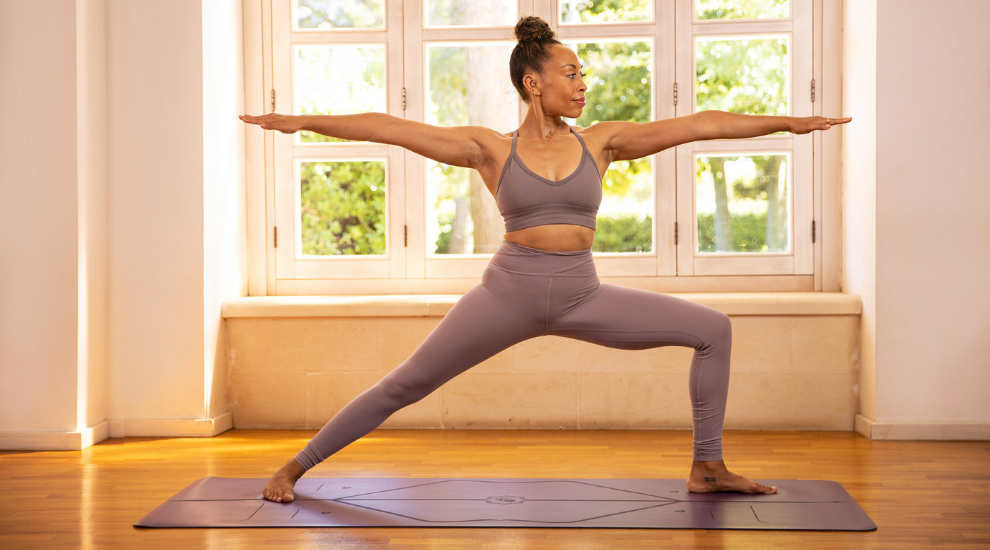
7. Warrior II (Virabhadrasana II)
Sanskrit Meaning: Virabhadra (a Hindu warrior)
Yoga Level: Beginner
Pose Type: Standing
Benefits: Strengthens the legs, back, arms, and core. Opens the hips, hamstrings, and chest.
Why this Pose: Keep the thigh-burning going with a longer hold in Warrior II.
Warming Tips:
- Work toward getting your front thigh parallel to the floor to build strength and warm your body.
- Warrior II also targets your core, shoulders, and arms.

8. Triangle Pose (Trikonasana)
Sanskrit Meaning: Trikona (Triangle)
Yoga Level: Beginner
Pose Type: Standing
Benefits: Side and hamstring stretch. Strengthens the legs.
Why This Pose: Now that you are warm, it’s time to do some poses that stretch as they strengthen. Triangle gets into your hamstrings and side-body.
Warming Tips:
- Place your bottom hand on a block or your shin so you can open your chest fully.
- Imagine rotating open so you can feel the sun on your sternum.

9. Half Moon Pose (Ardha Chandrasana)
Sanskrit Meaning: Ardha (Half) Chandra (Moon)
Yoga Level: Intermediate
Pose Type: Standing
Benefits: Strengthens the legs, glutes, and abs. Improves hip mobility. Stretches the hamstrings.
Why this Pose: Another opportunity to stretch your legs and work on your balance and alignment.
Warming Tips:
- As in Triangle, use a block under your bottom hand if it helps you open your chest more fully.
- Take your gaze to your top fingertips for a balance challenge.

10. Corpse Pose (Savasana)
Sanskrit Meaning: Sava (Corpse)
Yoga Level: Beginner
Pose Type: Supine
Benefits: Rests the body.
Why this Pose: After working hard, it’s important to take some time to rest and let your body absorb the effects of your practice.
Warming Tips:
- Don’t lose the heat you’ve created.
- Put on socks and a sweatshirt or cover yourself with a blanket while you rest.
- Set a timer for 10 minutes before you start so you can fully relax.
More Tips for a Safe and Effective Practice
Use props such as blocks and blankets to improve your alignment. Using props isn’t indicative of any shortcomings. It’s often the most effective way to practice safely and get the maximum benefit from each pose.
Stoke Your Inner Fire
You can’t change the weather, but you can turn up your inner heater. So, find your sunniest corner, roll out your yoga mat, and prepare to fire up your muscles. You never regret the time you spend on your mat, especially when you feel a lot warmer afterwards.











